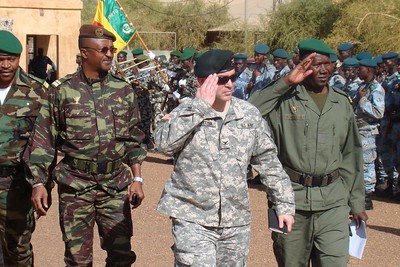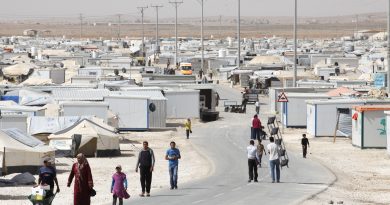The Sahel: Terrorism’s Forgotten Front
Pranali Jain
Staff Writer
The term “terrorism” is often associated with the Levant region in Western Asia, also known as the Middle East – which is not surprising, considering the disproportionate focus that Western media places on terrorism in that region. However, while terrorism continues to be a global threat, in recent years, its epicenter has shifted to Africa – specifically in West Africa, the Sahel, and the Lake Chad Basin regions. The countries in these regions – Mali, Burkina Faso, Niger, Nigeria, Chad, and Cameroon – are major hotspots for terrorist operations. In 2021, 48 percent of all terrorism-related deaths across the world occurred in West Africa and the Sahel, according to Foreign Policy. Moreover, the UN reports that in 2022 alone, the continent witnessed 7,816 terrorism-related deaths. Despite the alarming proliferation of terrorism and terrorist activity on the continent, however, media coverage remains minimal.
The rise in terrorism in the Sahel region can be traced back to the fall of Muammar Gaddafi of Libya in 2011, which opened a power vacuum allowing arms to be transported across the region to terrorist cells affiliated with the Islamic State or Al-Qaeda in Mali and Burkina Faso. In the past 12 years, these terrorist groups have continuously taken advantage of the instability of the Sahel region and weakened states further. Over the last few years, a wave of coups and attempted coups in Burkina Faso, Chad, Mali, Guinea, and more recently, Niger, have been directly linked to the growing insecurity in the region due to the spread of terrorism. Niger’s coup on July 23 was the ninth in a series of coups in West Africa. According to the leaders of the coup, their actions were in response to the state’s worsening security and lack of substantial action against the jihadists. Similar reasoning has been provided by juntas of neighboring states to justify the coups.
The recent coup in Niger, a state that was considered an essential Western ally in the region against extremists and one of the last beacons of democracy in the Sahel, only deteriorates the situation and further complicates counter-terrorism efforts. Western governments, the United Nations, and the African Union have presented Nigerien coup leaders with an ultimatum – either restore civilian control or face a series of sanctions. The French government has also suspended budgetary support and the United States has halted all security operations within Nigerien borders. This has led Niger and other states facing similar Western rebukes to turn to Russia’s Wagner Group, a private military company affiliated with Russian President Vladimir Putin and notorious for human rights abuses and exploitation, to fill in the gaps in security left by Western militaries. Simultaneously, terrorist groups in the region are also taking advantage of the fragile situation and are exploiting the security gaps to grow their organizations as foreign powers withdraw.
The combination of exploitative entities has exacerbated the dire humanitarian conditions and political instability in the region. The recent coups have further initiated an endless cycle of growth for terrorist activity. Acute food insecurity and an increase in human displacement, amongst other issues, are the immediate consequences of the rise of extremist violence and democratic regression within the region. And with suspended foreign aid and support, the socioeconomic conditions in Niger, Mali, and the Sahel as a whole, will worsen.
The deteriorating socioeconomic conditions in West Africa and the Sahel are one of the main reasons why terrorism is able to grow rapidly and flourish within the region. High unemployment rates, hunger, lack of basic services, and the constant volatility in the political sphere have forced civilians to resort to desperate measures to procure basic needs. In other words, the dire socioeconomic situation has simplified recruitment for terrorist groups operating in the region. Terrorist groups are able to draw recruits with the promise of providing them with basic necessities and protection – something the governments in the region have failed to provide. Studies by the UN Development Program show that 25 percent of recruits were experiencing unemployment at the time of recruitment, and almost 40 percent of recruitsts claimed they joined as a means to meet basic necessities. For example, in Nigeria, the main terrorist organization – Boko Haram – recruits students from poor families in the poverty-stricken areas of Northern Nigeria.
Terrorist groups in the region are also taking advantage of state insecurity and political instability to fund their organizations and strengthen their foothold in the Sahel through illegal means. These groups are known to traffic drugs and minerals, organize kidnappings for ransom, and engage in other illegal activities to support their operations – all of which are made easier during a time of weak governance and political crises. The already dire socioeconomic circumstances of the Sahel, coupled with the recent coups, have laid fertile ground for terrorism to flourish at an alarming rate in the region. As Wagner’s presence grows, the circumstances in affected states are only expected to get worse.
Counter-terrorism efforts in the region have usually focused primarily on strengthening security and consisted of military training and aid from Western governments. For instance, the annual Flintlock event, held this year in Ghana and Ivory Coast, is a U.S.-led military special training exercise for West African militaries and law enforcement to help combat extremist violence. Similar approaches have been enacted by the French government and other African governments in attempts to stabilize the region and diminish terrorist violence. Yet, counter-insurgency measures that have solely focused on military operations have proven to be unsuccessful.
Security-driven responses to combat terrorism hardly address the socioeconomic drivers of terrorism and related instability in the region. Governments and organizations need to invest more time and resources to address the root causes of extremist violence and tailor counterterrorism approaches specific to the Sahel region. Investment and support must be directed toward developmental solutions that seek to minimize or resolve the high unemployment rates, lack of education and access to basic needs, poverty, and food insecurity. Security-focused approaches, although important, have proven to be costly, inadequate, and, at times, worsened the situation altogether.
In order to successfully curb the proliferation of terrorism in the region, governments also need to employ a bottom-up approach and invest in developmental efforts that put communities at the center of the post-conflict healing process and counter-terrorism efforts. For example, community rebuilding and healing services that focus on mental health in Rwanda, Kenya, and the Lake Chad Basin region post conflict has helped reduce the recidivism of defectors and forced recruits. Programs that focus on socioeconomic development, education, and employment are also drastically expected to stabilize communities and improve prevention records. It should be noted that programs such as Flintlock have an international law and “humane war” component to them, which urge militaries and law enforcement of participating states to value civilian life and conduct war in accordance with international law. Nevertheless, they still fail to actually address the root causes of terrorism’s expansion in the region.
Additionally, the enforcement of economic sanctions in response to the recent coups will only exacerbate the poor socioeconomic state of the affected region, placing additional pressure on communities to resort to unsavory means of survival. Hence, governments not only need to strike a delicate balance between allocating resources between security and developmental approaches to combat terrorism in the Sahel, but also between punishing insurgents and coup leaders while safeguarding civilian needs.
As the Sahel region continues to serve as a hotbed for terrorist activity, governments and international organizations are failing to address the root causes of the rapid expansion of insurgency in the region. As the region steadily succumbs to insecurity and political instability due to a lack of successful counterterrorism efforts, the situation continues to worsen as terrorists and other exploitative groups have strengthened their presence. With each day, it becomes imperative that the current counter-terrorism paradigm shift to accommodate the region’s socioeconomic needs to combat extremism successfully.
Image courtesy of US Africa Command, Flickr




